

Fall Activities for Caregivers

An update from Tia Drumm, Caregiver Programs Coordinator
With the fall and winter season on the horizon, this is a great time to explore indoor engagement opportunities around your community! When looking for events for you and your loved one to attend, here are a few factors to keep in mind:
1. Accessibility and safety of the building: Will it be easy to get your loved one in and out?
2. Programming level: Based on your loved one’s abilities, is this something they would be able to take part in?
3. Interest level: What level of interest does your loved one show in this event or project? If your loved one doesn’t seem interested, don’t push it. Try again at a later time!
4. Transportation: Are you able to safely transport your loved one to the event and back?
LifeStream has many options for engagement yearround in a variety of capacities:
1. Muncie’s Memory Café: Memory Cafés are a welcoming safe place for people with dementia and their caregivers to enjoy activities and a break from their normal routine. This is an opportunity to socialize and connect with others in a similar situation! Lunch and activity are provided at no cost with RSVP.
2. Caregiver Gatherings (Support Groups): Caregiver Gatherings are a time for caregivers to come
together and take a break, enjoy food, share resources, and support one another. This event is for anyone who is providing care in any way, shape, or form. Lunch and beverage are provided at no cost; RSVP is NOT required.
3. National Caregiver Month Celebration: The purpose of this event is to give you the recognition that you deserve, as well as give you an opportunity to rest, enjoy good food and company, and do something fun.
You can find all meal sites, events, and other offerings on LifeStream’s event page at lifestreaminc.org/calendar
For more information about LifeStream’s STEP In Caregiver Programs, contact Tia Drumm at (765) 759-1121 ext. 101 or stepin@lifestreaminc.org.


Sleep, Exercise, & Social Connections
An update from Kelly Smith, Dementia Outreach Specialist
Brain aging is a natural process, but how quickly or severely it occurs can be shaped by daily choices. Cognitive decline is not an inevitable outcome of growing older. Research consistently shows that lifestyle factors play a significant role in preserving mental sharpness, memory, and overall brain health. Among these factors, three stand out as particularly impactful: sleep, physical activity, and social engagement.
Sleep: The Brain’s Critical Recovery Period

Sleep is more than rest; it is a period of active maintenance for the brain. During deep stages of sleep, the brain clears away metabolic waste products, including beta-amyloid, a protein associated with Alzheimer’s disease. Adequate sleep also supports memory consolidation, problem-solving, and emotional regulation.
In contrast, chronic sleep deprivation is strongly linked to accelerated cognitive decline and increased dementia risk. Experts recommend aiming for seven to nine hours of quality sleep each night. Consistency in sleep routines such as maintaining regular bed and wake times, limiting caffeine intake in the afternoon, and creating a calming pre-sleep environment can significantly enhance sleep quality and long-term brain resilience.
Exercise: Protecting and Strengthening Neural Networks
Physical activity benefits the brain as much as the body. Exercise improves circulation, ensuring the brain receives adequate oxygen and nutrients. More importantly, it stimulates the production of brain-derived neurotrophic factor (BDNF), a protein that supports the growth of new neurons and strengthens connections between existing ones.
Regular exercise can enlarge the hippocampus; the brain region central to learning and memory while also lowering inflammation and stress hormones. Notably, the cognitive benefits of exercise are not limited to intense training. Moderate, consistent activity like brisk walking, cycling, swimming, or resistance training several times per week is sufficient to provide measurable protection against age-related cognitive decline.
Social Connections: Cognitive and Emotional Safeguards
Humans are inherently social beings, and meaningful relationships serve as a protective factor for brain health. Social interaction challenges the brain through conversation, shared experiences, and emotional exchange. These activities stimulate multiple cognitive processes simultaneously, helping to keep the mind agile. Conversely, social isolation is strongly associated with an elevated risk of dementia and accelerated brain aging. Maintaining active social networks whether through family, friendships, community organizations, or group activities helps preserve cognitive function and supports overall emotional well-being. Even simple, regular interactions such as phone calls, shared meals, or participation in volunteer activities can provide benefits.
Integrating Lifestyle for Optimal Brain Health
Each of these factors; sleep, exercise, and social connection works independently to protect cognitive function, but their combined effect is far greater. Sleep provides the restorative foundation, exercise fuels and strengthens neural structures, and social engagement keeps the brain cognitively and emotionally active.
Prioritizing these elements does not guarantee freedom from age related decline, but it can substantially delay its onset and lessen its severity. By treating brain health as a long-term investment, individuals can enhance quality of life, preserve independence, and support mental vitality well into older adulthood.


Dementia Education for Children
An update from Rachel Gray, Care Coach
As more families are affected by dementia, whether through a grandparent, neighbor, or family friend, it’s important to help children understand what it is and how to interact compassionately with those living with it. While dementia can be confusing or even scary for kids at first, guiding them with age-appropriate knowledge and empathy can make a meaningful difference.
Talking to Kids About Dementia
Start by keeping the conversation simple and honest. For younger children, you might say: “Grandpa’s brain is not working as well as it used to. He might forget your name sometimes, but he still loves you.” Older children may benefit from more detail about how dementia affects communication and memory. Encourage them to ask questions and express their feelings; validating their confusion or frustration is important.
How Kids Can Talk to Someone with Dementia
Kids can learn simple, helpful ways to talk to individuals with dementia:
• Be patient: Speak slowly and clearly. Give the person time to respond.
• Use short sentences: Avoid complicated language or questions with too many options.
• Be friendly and calm: A warm smile or gentle tone can go a long way.
• Use names: Saying their name or reminding them who you are (“Hi Grandma, it’s me, Emma.”) helps with recognition.
Helping Kids Stay Involved
Involving children in caregiving or visits helps them build empathy and stay connected. Encourage them to...
• Share old photos or stories.
• Read a book together.
• Help with small tasks, like bringing a glass of water or brushing hair.
These simple acts of kindness can be comforting for both the child and the person living with dementia. Teaching children about dementia fosters empathy, patience, and a sense of responsibility. By helping them understand the condition and how to interact with loved ones who have it, we equip the next generation to handle it with care and compassion. Most importantly, children learn that even when someone’s memory fades, love and connection can remain strong.



How Diet Affects Brain Health
An update from Kellie Magoon, Care Coach
The brain is our body’s command center, and what we eat has a big impact on how well it works. Research shows that a healthy diet can help protect our memory, lower the risk of dementia (including Alzheimer’s), and even improve quality of life for people already living with it. On the other hand, diets high in sugar, fried foods, and processed snacks can speed up brain aging.
Food affects the brain in many ways. Unhealthy fats and sugars can cause inflammation and block proper blood flow, which may lead to memory loss over time. But foods rich in antioxidants, like colorful fruits and vegetables, help fight damage to brain cells. Omega-3 fatty acids from fish strengthen brain cell walls and decrease inflammation. Even the gut is connected to the brain—eating fiber-rich foods helps support brain health.
There are a few eating plans that can help you improve your diet: the Mediterranean diet and the MIND diet. Both focus on fruits, veggies, whole grains, beans, fish, nuts, and olive oil while limiting red meat, butter, cheese, and sweets. Studies link these diets to slower memory decline and fewer Alzheimer’srelated brain changes.
Here are some simple steps:
• Eat green leafy veggies often, and add berries a couple times a week.
• Choose fish or poultry instead of red meat, and use olive oil instead of butter.
• Snack on nuts, and pick whole grains like oats or quinoa.
• Cut back on fried and processed foods.
• Drink plenty of water and limit alcohol.
Small changes now can add up to stronger brain health later in life.





Myths About Dementia from AFA®
MYTH #1: Memory loss means dementia.
People naturally forget from time to time, but dementia is much more than occasional lapses. It’s memory issues that are affecting daily functioning. Also, memory loss isn’t the first dementia symptom. Unexplained changes in mood, behavior or ability should warrant a visit to the doctor.
MYTH #2: Only older people get dementia.
Many types of dementia can affect people at an earlier age. Young-onset Alzheimer’s disease, for example, can affect people in their 50s—and even earlier in some cases—as well as frontotemporal dementia.
MYTH #3: People with dementia become agitated, violent and aggressive. Not all people with dementia become agitated, violent or aggressive—though, of course, some people do. Dementia affects every person differently. Changes in the brain can create confusion and fear, and often expressions such as agitation are really the result of an unmet need.
MYTH #4: People with dementia can’t enjoy new activities, learn new things or have a good quality of life. People with dementia can and do continue to have meaningful, active lives. It’s important that they try to continue to enjoy their usual activities for as long as they can, making some adaptations, and relying on help from others. Many people in the earlier stages of dementia—and even into the middle stages—can learn new routines and habits. Most importantly, during all stages of dementia, people are capable of giving and receiving love, able to share moments of joy and laughter.
MYTH #5: Nothing can be done for dementia.
It’s important to overcome the idea that “nothing can be done for dementia.” The sooner a dementia diagnosis is made, the more opportunity there is for treatments and therapies that may actually slow the progression. Conversations with family and friends should focus on what the person living with dementia is still able to do and what brings them joy, rather than declines and losses. This will help ensure they are able to enjoy the best quality of life possible.



Source: https://alzfdn.org/5-common-misconceptions-about-dementia/
LifeStream offer programs in support of bringing awareness and education of dementia:
• Dementia Friends Info Sessions
• Dementia Friends Generations K-12
• Dementia Friendly location trainings
• Dementia Live sensory experiences
• Alzheimer’s Foundation of America’s® National Memory Screening Program (NMSP)
For more information or questions about our programs, contact our Dementia Outreach Specialists: Christy Davidson, (765) 759-1121 ext. 298; Kelly Smith, (765) 759-1121 ext. 297.
1701 Pilgrim Blvd.
Yorktown, IN 47396
lifestreaminc.org
(800) 589-1121 | lifestreaminc.org | facebook.com/lifestreamservices
LifeStream’s 50th Anniversary Cookbook
As LifeStream celebrates 50 years of service in 2025, we thank the many staff, volunteers, and community members who have made us who we are and continue to help us make a positive impact throughout East Central Indiana.
LifeStream would like to thank the many people who have contributed to this project. Senior Café participants and site leaders, clients, volunteers, staff, and friends have all submitted recipes that have been a special part of their lives, and we are excited to now share this with you.
Nutrition is a vital part of health; not just for the physical benefits, but also for the social connection it can bring. We hope that this cookbook brings you opportunities to create not only a delicious meal, but also a new friendship or connection. Thank you for being an important part of LifeStream’s nutrition past, present, and future!


Order a LifeStream 50th Anniversary Cookbook for $15 now at www.lifestreaminc.org/50thcookbook
